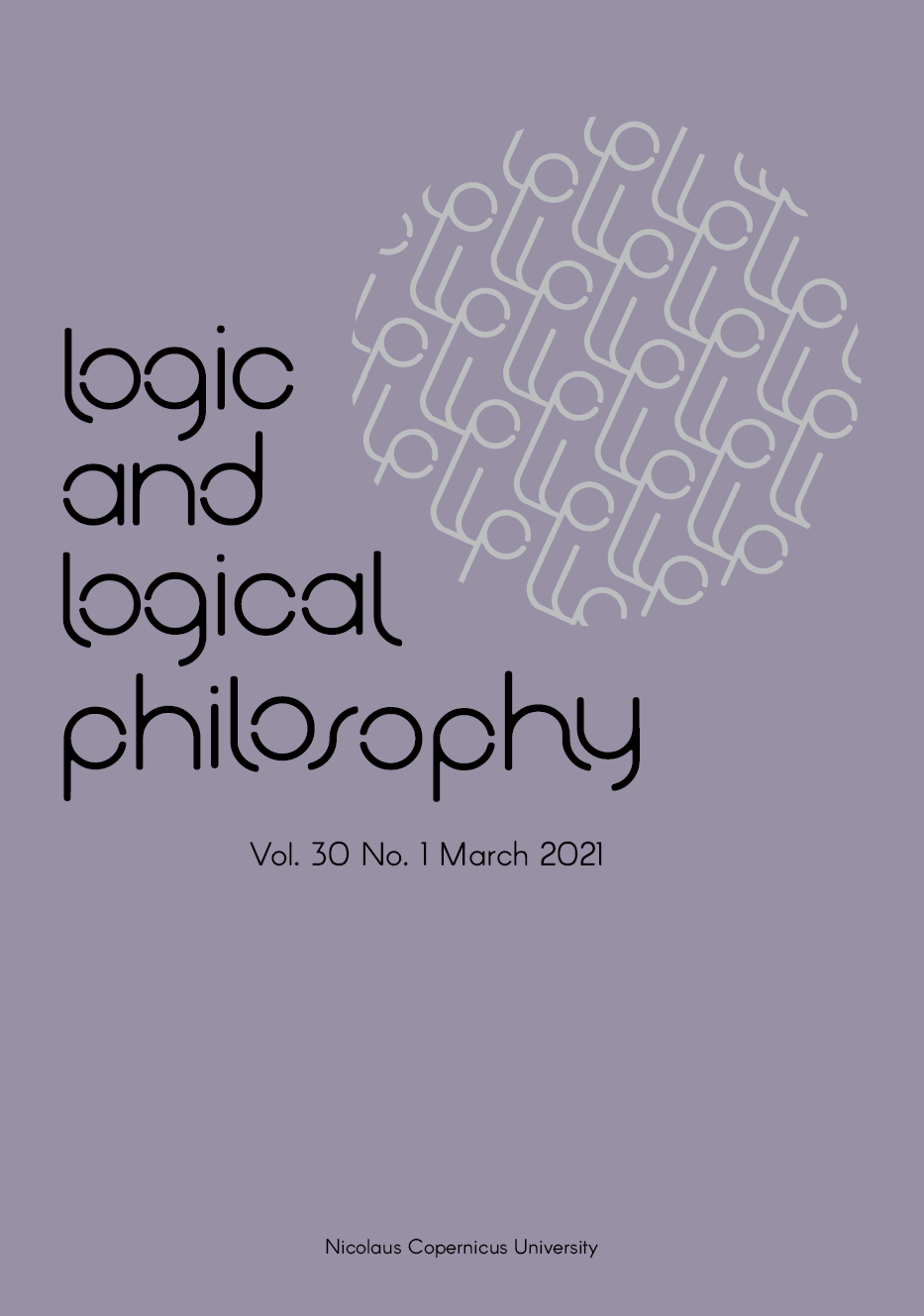A Note on Gödel, Priest and Naïve Proof
DOI:
https://doi.org/10.12775/LLP.2020.017Keywords
incompleteness, standard model, naïve proof, dialetheia, liar paradox, Curry’s paradoxAbstract
In the 1951 Gibbs lecture, Gödel asserted his famous dichotomy, where the notion of informal proof is at work. G. Priest developed an argument, grounded on the notion of naïve proof, to the effect that Gödel’s first incompleteness theorem suggests the presence of dialetheias. In this paper, we adopt a plausible ideal notion of naïve proof, in agreement with Gödel’s conception, superseding the criticisms against the usual notion of naïve proof used by real working mathematicians. We explore the connection between Gödel’s theorem and naïve proof so understood, both from a classical and a dialetheic perspective.
References
Beall, J., and J. Murzi, 2013, “Two flavors of Curry’s paradox”, The Journal of Philosophy 110 (3): 143–65. DOI: http://dx.doi.org/10.5840/jphil2013110336
Berto, F., 2009, “The Gödel paradox and Wittgenstein’s reasons”, Philosophia Mathematica 17: 208–219. DOI: http://dx.doi.org/10.1093/philmat/nkp001
Caret, C.R., and Z Weber, (2015, “A note on contraction-free logic for validity”, Topoi 34 (1): 63–74. DOI: http://dx.doi.org/10.1007/s11245-014-9241-z
Carrara, M., S. Gaio and E. Martino, 2010, “Can Priest’s dialetheism avoid trivialism?”, pages 53–64 in M. Peliš and V. Punčochoř (eds.), The Logica Yearbook, College Publications: London.
Carrara, M., and E. Martino, 2011, “Curry’s paradox. A new argument for trivialism”, Logic and Philosophy of Science 9: 199–206.
Chihara, C.S., 1984, “Priest, the liar, and Gödel”, Journal of Philosophical Logic 13 (2): 117–124. DOI: http://dx.doi.org/10.1007/BF00453016
Cobreros, P., P. Egré, D. Ripley and van R. Rooij, 2012, “Tolerant, classical, strict”, Journal of Philosophical Logic 41 (2): 347–85. DOI: http://dx.doi.org/10.1007/s10992-010-9165-z
Cobreros, P., P. Égré, D. Ripley, and van R. Rooij, 2013, “Reaching transparent truth”, Mind 122 (488): 841–866. DOI: http://dx.doi.org/10.1093/mind/fzt110
Dummett, M., 1978, Truth and Other Enigmas, Duckworth: London.
Field, H., 2008, Saving Truth from Paradox, Oxford University Press: Oxford.
Fitch, F., 1942, “A basic logic”, Journal of Symbolic Logic 7: 105–14. DOI: http://dx.doi.org/10.2307/2269291
Fitch, F., 1948, “An extension of basic logic”, Journal of Symbolic Logic 13:95–106. DOI: http://dx.doi.org/10.2307/2267330
Fitch, F., 1950, “A further consistent extension of basic logic”, Journal of Symbolic Logic 14: 209–18. DOI: http://dx.doi.org/10.2307/2269228
Gödel, K., 1951, “Some basic theorems in the foundations of mathematics and their implications”, pages 304–323 in S. Feferman et. al. (eds.), Collected Works, volume III, Oxford University Press: Oxford.
Hilbert, D, 1976, “Mathematische probleme, vortrag, gehalten auf dem internationalen mathematiker kongress zu paris” (1900), pages 1–34 in F. Browder (ed.), Proceedings of Symposia in Pure Mathematics, volume 28, American Mathematical Society, Providence.
Lucas, J.R, 1961, “Minds, machines, and Goedel”, Philosophy 36: 112–137.
Mares, E., and F. Paoli, 2014, “Logical consequence and the paradoxes”, Journal of Philosophical Logic 43: 439–469. DOI: http://dx.doi.org/10.1007/s10992-013-9268-4
Martin-Löf, P., 1995, “Verificationism then and now”, pages 187–196 in M. van der Schaar (ed.), The Foundational Debate: Complexity and Constructivity in Mathematics and Physics, “Vienna Circle Institute Yearbook 3”, Kluwer: Dordrecht.
Murzi, J., and M. Carrara (eds.), 2015a, “Paradox and logical revision”, Topoi, volume 34.
Murzi, J., and M. Carrara, 2015b, “Paradox and logical revision: A short introduction”, Topoi 34: 7–14. DOI: http://dx.doi.org/10.1007/s11245-014-9286-z
Murzi, J., and L. Shapiro, 2014, “Validity and truth-preservation”, pages 431–460 in T. Achourioti, H. Galinon, J. Martinez-Fernandez and F. Fujimoto (eds.), Unifying the Philosophy of Truth, Springer: Berlin. DOI: http://dx.doi.org/10.1007/978-94-017-9673-6_22
Penrose, R., 1994, Shadows of the Mind, Oxford University Press: Oxford.
Priest, G., 1979, “The logic of paradox”, Journal of Philosophical Logic 8: 219–241. DOI: http://dx.doi.org/10.1007/BF00258428
Priest, G., 1994, “Is arithmetic consistent?”, Mind 103: 337–349. DOI: http://dx.doi.org/10.1093/mind/103.411.337
Priest, G., 2006, In Contradiction, Oxford University Press: Oxford. Expanded edition (first published 1987, Kluwer: Dordrecht).
Priest, G., 2015, “Fusion and confusion”, Topoi 34 (1): 55–61. DOI: http://dx.doi.org/10.1007/s11245-013-9175-x
Priest, G., 2019, “Some comments and replies”, pages 575–675 in C. Başkent and T.M. Ferguson (eds.), Graham Priest on Dialetheism and Paraconsistency, Springer: Berlin. DOI: http://dx.doi.org/10.1007/978-3-030-25365-3_27
Ripley, D., 2013, “Paradoxes and failures of cut”, Australasian Journal of Philosophy 91 (1): 139–164. DOI: http://dx.doi.org/10.1080/00048402.2011.630010
Ripley, D., 2015a, “Anything goes”, Topoi 34 (1): 25–36. DOI: http://dx.doi.org/10.1007/s11245-014-9261-8
Ripley, D., 2015b, “Comparing substructural theories of truth”, Ergo 2: 299–328. DOI: http://dx.doi.org/10.3998/ergo.12405314.0002.013
Shapiro, L., 2011, “Deflating logical consequence”, The Philosophical Quarterly 61: 320–342. DOI: http://dx.doi.org/10.1111/j.1467-9213.2010.678.x
Shapiro, L., 2013, “Validity Curry strengthened”, Thought 2: 100–107. DOI: http://dx.doi.org/10.1002/tht3.80
Shapiro, S., 2002, “Incompleteness and inconsistency”, Mind 111: 817–832. DOI: http://dx.doi.org/10.1093/mind/111.444.817
Shapiro, S., 2019, “Inconsistency and incompleteness, revisited”, pages 469–479 in C. Başkent and T.M. Ferguson (eds.), Graham Priest on Dialetheism and Paraconsistency, Springer: Berlin. DOI: http://dx.doi.org/10.1007/978-3-030-25365-3_22
Smiley, T., 1957, “Entailment and deducibility”, Proceedings of the Aristotelian Society 59: 233–254.
Tanswell, F.S., 2016, “Saving proof from paradox: Gödel’s paradox and the inconsistency of informal mathematics”, pages 159–173 in H. Andreas and P. Verdée (eds.), Logical Studies of Paraconsistent Reasoning in Science and Mathematics, Springer: Berlin. DOI: http://dx.doi.org/10.1007/978-3-319-40220-8_11
Weber, Z., 2014, “Naïve validity”, Philosophical Quarterly 64 (254): 99–114. DOI: http://dx.doi.org/10.1093/pq/pqt016
Weir, A., 2005, “Naïve truth and sophisticated logic”, pages 218–249 in J. Beall and B. Armour-Garb (eds.), Deflationism and Paradox, Oxford University Press: Oxford.
Whittle, B., 2004, “Dialetheism, logical consequence and hierarchy”, Analysis 64 (4): 318–326. DOI: http://dx.doi.org/10.1093/analys/64.4.318
Zardini, E., 2011, “Truth without contra(di)ction”, Review of Symbolic Logic 4: 498–535. DOI: http://dx.doi.org/10.1017/S1755020311000177
Zardini, E., 2012, “Näive modus ponens”, Journal of Philosophical Logic 42 (4): 575–593. DOI: http://dx.doi.org/10.1007/s10992-012-9239-1
Zardini, E., 2013a, “It is not the case that [p and ‘it is not the case that p’ is true] nor is it the case that [p and ‘p’ is not true]”, Thought 1 (4): 309–319.
Zardini, E., 2013b, “Näive logical properties and structural properties”, The Journal of Philosophy 110 (11): 633–644. DOI: http://dx.doi.org/10.5840/jphil2013110118
Zardini, E., 2015, “Getting one for two, or the contractors’ bad deal. Towards a unified solution to the semantic paradoxes”, pages 461-493 in T. Achourioti, H. Galinon, J. Martinez-Fernandez and F. Fujimoto (eds.), Unifying the Philosophy of Truth, Springer: Berlin. DOI: http://dx.doi.org/10.1007/978-94-017-9673-6_23
Downloads
Published
How to Cite
Issue
Section
Stats
Number of views and downloads: 746
Number of citations: 0







